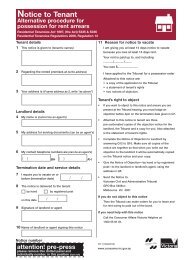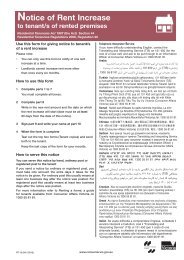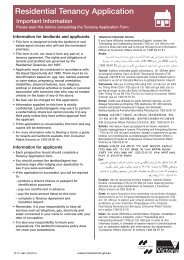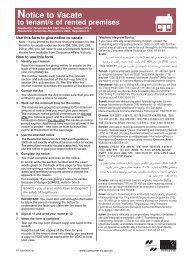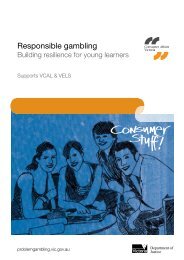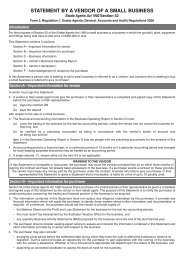Renting a home: a guide for tenants - Consumer Affairs Victoria
Renting a home: a guide for tenants - Consumer Affairs Victoria
Renting a home: a guide for tenants - Consumer Affairs Victoria
You also want an ePaper? Increase the reach of your titles
YUMPU automatically turns print PDFs into web optimized ePapers that Google loves.
The bond<br />
Most landlords will ask you to pay a<br />
bond. A bond acts as a security that<br />
you will meet the terms of your tenancy<br />
agreement. If you fail to keep the property<br />
clean, cause damage or are in rent arrears,<br />
your landlord can claim some or all of the<br />
bond when the tenancy ends.<br />
If your rent is $350 a week or less, the<br />
bond cannot be more than one calendar<br />
month’s rent. Your landlord cannot<br />
increase the bond during your tenancy.<br />
Looking after the bond<br />
Your bond money is held by the<br />
Residential Tenancies Bond Authority<br />
(RTBA).<br />
If your landlord receives a bond, they<br />
must give you a completed and signed<br />
official ‘Bond Lodgement’ <strong>for</strong>m to sign.<br />
‘Bond Lodgement’ <strong>for</strong>ms<br />
can be generated on the<br />
RTBA Online website at<br />
rentalbonds.vic.gov.au.<br />
Forms are also available from<br />
<strong>Consumer</strong> <strong>Affairs</strong> <strong>Victoria</strong>:<br />
call 1300 55 81 81.<br />
Payment must be made by cheque<br />
or money order to the ‘Residential<br />
Tenancies Bond Authority’. The postal<br />
details are on page 40 and on the ‘Bond<br />
Lodgement’ <strong>for</strong>m.<br />
The RTBA will send a receipt to you and<br />
your landlord. Contact the RTBA if you<br />
have not received a receipt 15 business<br />
days after paying your bond.<br />
PART 1: Beginning a tenancy<br />
Bonds from the Director of Housing<br />
(DoH)<br />
If you are on a low income and can af<strong>for</strong>d<br />
to rent privately, but are struggling to pay<br />
the up-front costs, you may be eligible <strong>for</strong><br />
a bond loan from the DoH.<br />
A DoH ‘Bond Lodgement’ <strong>for</strong>m must be<br />
used when the DoH contributes some or<br />
all of the bond. The DoH will issue the<br />
<strong>for</strong>m with the bond payment when a<br />
bond loan is approved.<br />
To find out if you are eligible <strong>for</strong> a<br />
DoH bond loan, contact the DoH through<br />
the Office of Housing > see page 41 <strong>for</strong><br />
contact details.<br />
Dishonoured bond payments<br />
If a bond payment to the RTBA is<br />
dishonoured, the landlord can organise to<br />
collect the money and re-lodge the bond,<br />
give you a 14-day ‘Notice to Vacate’ <strong>for</strong> nonpayment<br />
of a bond, or waive the bond.<br />
Difference between bond and rent<br />
Your bond and rent are separate<br />
payments. You may be fined <strong>for</strong> treating<br />
any part of the bond as rent.<br />
You must continue to pay rent until you<br />
vacate even if:<br />
• your landlord has refused to do repairs<br />
• you have given your landlord notice of<br />
your intention to vacate<br />
• your landlord has given you a<br />
‘Notice to Vacate’.<br />
11



